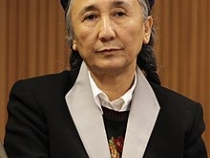
Rebiya Kadeer is the most prominent human rights advocate and leader of the Uyghur people. Mrs. Kadeer, 68, is the mother of eleven children, and a former laundress turned millionaire. She spent six years in a Chinese prison as a prisoner of conscience for standing up to the authoritarian Chinese government. Before her arrest in 1999, she was a well-known Uyghur businesswoman and at one time the seventh wealthiest individual in the People’s Republic of China.
Mrs. Kadeer is a loving mother, a philanthropist, and a political activist. She built up and ran a multimillion-dollar trading company and a department store in Urumqi, the capital of Xinjiang Uyghur Autonomous Region (XUAR, formerly East Turkestan). She was passionate in helping out oppressed Uyghurs, especially women and children. In order to educate Uyghur children from poor families, she provided free classes using space in her department store. In December of 1997, she started the “Thousand Mothers Movement” to empower Uyghur women to start their own businesses.
Mrs. Kadeer’s philanthropic efforts were initially praised by the Chinese government and Chinese Communist Party. She was appointed a member of China’s National People’s Congress as well as the Chinese People’s Political Consultative Conference (CPPCC) in 1992, and a member of China’s delegation to the United Nation’s Fourth World Conference on Women in 1995.
Originally, Mrs. Kadeer hoped to improve the situation of the Uyghur people by working within the Chinese state apparatus. She attempted to persuade high-ranking Chinese officials, including China’s president, to change their hard-line, repressive policies against the Uyghurs. Beijing’s attitude towards Mrs. Kadeer changed when she criticized China’s treatment of her people during a National People’s Congress session in March 1997. In her speech, she demanded that the Chinese government honor the autonomy conferred on the Uyghur people, and respect their human rights. She strongly criticized China’s harsh crackdown on the Uyghur student demonstration, which had taken place a month earlier in city of Ghulja.
To punish Mrs. Kadeer for her “disloyalty” to the Chinese Communist Party, she was stripped of her membership in both the National People’s Congress and the Chinese People’s Political Consultative Conference, and forbidden to travel abroad. Beijing also seriously pressured her to divorce her dissident husband, Sidik Rouzi, who had fled to the US in 1996.
In 1999, while on her way to meet with a US Congressional delegation, Mrs. Kadeer was unlawfully arrested and sentenced to eight years in prison for allegedly ‘stealing state secrets,’ which was a total fabrication.
Mrs. Kadeer’s case became an international embarrassment for the Chinese government after Amnesty International and Human Rights Watch publicized her case and aggressively pursued her freedom. In 2000, Human Rights Watch awarded Mrs. Kadeer its highest human rights award. In 2004, Norway’s Rafto Foundation for Human Rights honored her with the Professor Thorolf Rafto Memorial Prize (Rafto Prize) for her unyielding dedication to the promotion of human rights. Then, on March 17, 2005, three days before an official visit to Beijing by the US Secretary of State, and amidst mounting international pressure on China for her release, she was released from prison on medical grounds.
Mrs. Kadeer has been actively campaigning for human rights protection of the Uyghur people since her release. Despite the Chinese government’s myriad efforts to discredit her, Mrs. Kadeer remains the leader and ‘Mother of the Uyghur nation,’ whom the Uyghur people have entrusted with their lives and hopes for a better future.
